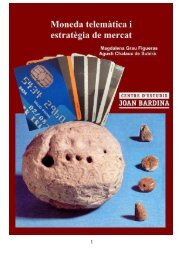Telematic currency and market strategy (mtemuk.pdf). - Centre d ...
Telematic currency and market strategy (mtemuk.pdf). - Centre d ...
Telematic currency and market strategy (mtemuk.pdf). - Centre d ...
You also want an ePaper? Increase the reach of your titles
YUMPU automatically turns print PDFs into web optimized ePapers that Google loves.
The first problem was the submission of the countries considered «weak» to the countries considered<br />
«strong». In fact, when a geopolitical society has a deficit in its trade balance, there are only two possibilities:<br />
to have recourse to international credit or to its <strong>currency</strong> reserve. If the deficit belongs to a geopolitical<br />
society producing reserve money, this society can actually finance its deficit by means of new monetary<br />
emissions.<br />
This was in fact the case of USA. The USA have taken advantage of their privileged monetary position up to<br />
the limit of their possibilities, by reabsorbing enormous deficits in their balance of payments through the<br />
uncontrolled emission of dollars. It must be pointed out that the origin of this deficit was not an excess of<br />
imports, it was an export of capitals not backed up by a corresponding entry of merch<strong>and</strong>ise.<br />
The USA policy of financing their deficit originated such an inflation of dollars in Europe<br />
(export of inflation), that the convertibility of the dollar, under the point of view of official<br />
st<strong>and</strong>ards, established in Bretton Woods, was jeopardized. From 1967-68 inconvertibility<br />
became a fact, even if it was not officially declared until August 1971, when president Nixon<br />
denounced unilaterally the Bretton Woods agreement.<br />
Since then, in spite of the attempts to find a readjustment according to the Washington agreement of<br />
December 1971, -also unilaterally denounced by Nixon in 1973- the gold exchange st<strong>and</strong>ard has been finally<br />
ab<strong>and</strong>oned <strong>and</strong>, at present, the <strong>currency</strong> exchange is considered «floating», that is there are no fixed st<strong>and</strong>ards<br />
<strong>and</strong> they are negotiated in a money <strong>market</strong>. Therefore, there is no reference to a possible convertibility to<br />
gold.<br />
Currency floatation is in itself no ill for foreign trade. From this point of view, the present situation would<br />
not be especially serious if it were not for a fundamental fact: as long as the domestic currencies of every<br />
geopolitical society are not rationalized, foreign trade will not be rational either, <strong>and</strong> therefore it will not reach<br />
the necessary equilibrium of balances, which should be its main goal.<br />
It is impossible to have an equilibrated foreign trade as long as:<br />
a. money units of the strong countries are imposed on those of the weaker countries. In spite of the<br />
crisis, the dollar has been able to bear the situation <strong>and</strong> still today it holds a pre-eminent position <strong>and</strong><br />
privilege which allows all its domestic money problems to be exported.<br />
b. there is still a speculative <strong>currency</strong> <strong>market</strong>. This has a capital importance. The possibility of<br />
exchanging a <strong>currency</strong> for another, without a parallel movement of goods, promotes greatly the purely<br />
speculative operations. When they are made on a great scale (erratic movements of capitals), they help<br />
to reinforce the existing money imbalance within each geopolitical society. They corner national<br />
banks <strong>and</strong> compel them to take external actions in order to keep within reasonable limits their<br />
currencies' st<strong>and</strong>ards. As always, the ones more injured are the weaker ones, both on a world level<br />
<strong>and</strong> in each domestic society.<br />
5. Functions of the money system today.<br />
We are now in a position to draw the final conclusions of the analysis we have developed on the money<br />
systems.<br />
With respect to the nature of the money systems, their present forms show more than ever their fundamental<br />
abstraction. The historical clash between nominalism <strong>and</strong> metallism has been largely won by the first one,<br />
even if the references <strong>and</strong> the defense of metallist theories still hold an interest in many books <strong>and</strong> writings<br />
on this matter. However, most of the critics admit now that the money system is a simple auxiliary instrument<br />
without any need to have an intrinsic <strong>and</strong> concrete value. We need only remember Schumpeter <strong>and</strong> Lord<br />
Kaldor.<br />
30



